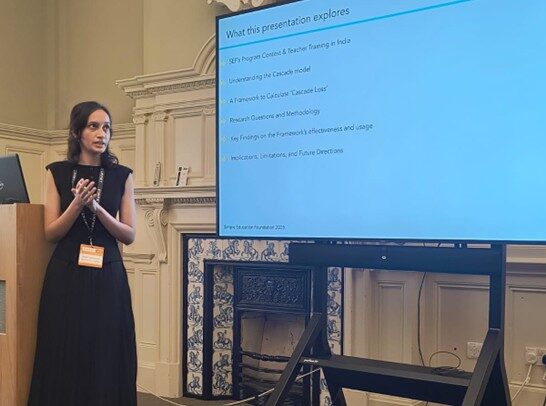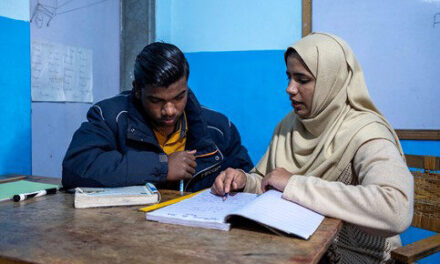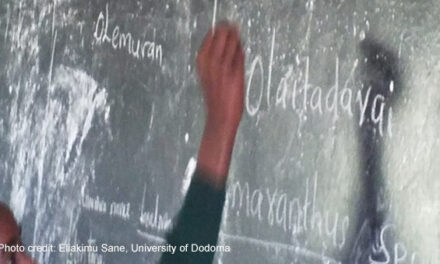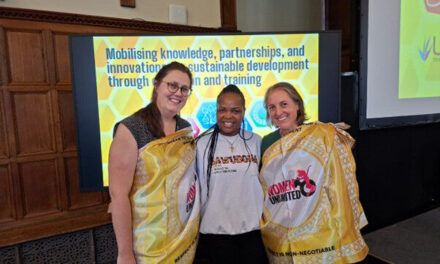This blog was written by Srinidhi Lakshmanan, Director, Research and Learning at Simple Education Foundation, India.
The UKFIET 2025 conference was my first international conference, and the opportunity to gather with a global education community that deeply cares about the state of the world and education today was extremely humbling and rewarding.
Its theme on ‘Mobilising Knowledge, Partnerships, and Innovations for Sustainable Development through Education and Training’ looked to bring together ‘’local, regional, and global perspectives to advance innovative, inclusive, and sustainable practices at all levels of education.’’
Feeling equal parts nervous and excited, I landed in Oxford, ready to soak up new perspectives and build new connections, while seeking comfort in the presence of familiar faces and colleagues.
The conference started with a moving opening keynote by Professor Ahmed Kamal Junina, Assistant Professor and Head of the English Department, Al-Aqsa University, Gaza and Professor Yusuf Sayed, Professor of International Education, REAL Centre, University of Cambridge. They urged us to think deeply about the purpose of education in relation to the many crises – inequality and poverty, war and displacement, climate degradation (to name a few) – we are facing today.
Their framing of ‘teaching as an act of resistance’ really stood out to me, as it positioned teaching as something that goes beyond merely the ‘technical’ aspects.
Against this backdrop, all the subsequent sessions, brought up reflections and questions related to:
- Centrality of the teacher’s role and its expanding dimensions
- Factors shaping teachers’ roles and agency
- The role of evidence and partnerships
Centrality of the teacher’s role and its expanding dimensions
My belief was strongly validated on centring the role and voice of teachers and local actors, if we are to reimagine education, its purpose and how it is delivered. However, unpacking what this role looks like in the current crisis and could look like in the future is extremely crucial. For example, the ever-expanding role of teachers was evident in multiple presentations, including the opening keynote and this session on ‘Education in emergencies’, which highlighted the dynamic nature of their role in ensuring that children continue learning even in the harshest of circumstances. Even in situations where an immediate policy response may not be present, teachers show up with resilience, resistance and adaptability, ready to reinvent and improvise. At the same time, discussions with participants from across countries revealed familiar themes and challenges – dipping motivation, unsupportive working conditions and increasing workload.
Factors shaping teachers’ roles and agency
This requires further reflection on how current policy and education reform is shaping the role of teachers and local actors and how we/me as researchers and practitioners are also shaping policy and reform.
Do these reforms centre teacher voice and agency and create space for innovation? What implications do these reforms have on their role and in turn on their professional identities and motivation? The session on ‘Teacher agency and voice for systemic change’ turned to some of these questions and showed how teacher agency and motivation are not just inherent individual characteristics but can be and need to be amplified at various levels – classroom, school, community, education systems – through an enabling environment.
I wonder whether expanding the scope of teachers’ roles without adequate policy or institutional support, and without addressing the contributions of other actors in the education system, risks leaving teachers overburdened and unsupported. I am curious to explore this in my context, specifically what teachers believe is and should be an important aspect of their role in the current landscape and how these intersect with their motivation and agency.
Diversifying the ‘global’ evidence base
Apart from the introspections on the ‘what’ and ‘why’ of reforms, I also had the opportunity to engage with the ‘how’ of it all – the role of evidence and working in partnership with governments.
It was clear that the growing discourse on evidence use in policymaking and its implications on the role of teachers cannot be ignored. But this comes with big questions that we must think about: What ‘counts’ as evidence and who sets the ‘standards’? How is evidence generated in one context being adapted for another? Whose evidence counts?
As a researcher from the Global Majority (South) these are all crucial questions that I have been thinking about. The session on ‘ Reflections and challenges in developing living evidence synthesis infrastructure for education’ introduced me to alternative frameworks that centre diverse forms of knowledge and locally-generated and relevant evidence that may traditionally not be considered. The use of such frameworks have led to the inclusion of local voices and an expansion of the evidence base for policymakers and other actors.
And lastly, the power of collaboration and working in partnership
Working in collaboration with teachers, state systems and local actors towards shared goals showed up in a variety of ways across countries. Multiple sessions including one of my presentations ‘Coming together: Pathways for research partnerships between state and non-state actors’, highlighted not just the benefits of working in partnership, but more interestingly, the ‘messy’ and complex ‘behind-the-scenes’ of these partnerships and how they can be navigated to co-produce knowledge and become more equitable.
As our session chair, Francesca Salvi summarised – the word ‘trust’ came up the most number of times across these presentations – revealing the deeply human and relational work that goes into systems transformation.
As I return to work with more questions than answers and reflect on implications for my practice, there is a certain comfort and hope in knowing that a group of practitioners and researchers are also thinking about these questions in their own contexts.





